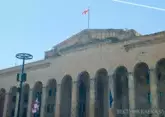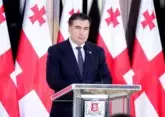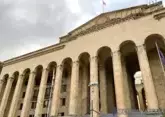Tents re-emerged on Rustaveli Avenue, in the center of the Georgian capital - for the first time after 2009, when opposition street protests demanding the resignation of then-President Mikhail Saakashvili took place in Tbilisi. But the head of state did not resign back them, and hundreds of tents and cells, symbolizing the "dictatorial regime of Saakashvili" were soon dismantled. However, the opposition defeated Mikhail Saakashvili's United National Movement (UNM) party and came to power after the October 1, 2012 parliamentary elections only thanks to the comprehensive assistance of one of the richest people in the world - billionaire Bidzina Ivanishvili, who managed to consolidate opposition forces in his Georgian Dream coalition (GD).
There aren't that many opposition tents now. Not hundreds (as nine years ago), but about twenty. They are pitched on the very spot, where the Rose Revolution started in November 2003 under the leadership of Saakashvili, and where in 2009 the opposition launched a wide popular movement that led to a change of power in 3.5 years. That is why the leaders of the ruling party are noticeably nervous. Ivanishvili even said that the organizers of the rally with tents in the city center "are preparing a springboard" for returning Saakashvili, living in the Netherlands, to the Georgian policy.
The billionaire was referring to the official sponsors of the action Zaza Saralidze, Malkhaz Machalikashvili, whose sons were killed last December under various circumstances: 16-year-old David Saralidze - during a fight with high school students, and his peer Tamerlan Machalikashvili was shot dead by a special forces soldier of the Interior Ministry during a large-scale operation in Georgia's Pankisi Gorge, near the border with Dagestan and Chechnya.
Zaza and Malkhaz, who for almost a year demanded that the authorities restore justice and punish those involved in the killings, asked the opposition forces for help. Saakashvili and his team actively supported the demands of the protesters, accusing the ruling party of not wanting to investigate the killings of young people. The society sympathizes with fathers who have lost their sons, and this sympathy may become the opposition's argument in favor of starting mass protests immediately after the second round of presidential election.
Its date has not yet been determined, but the two main candidates, both former Georgian foreign ministers Salome Zurabishvili (the GD) and Grigol Vashadze (the UNM), gained approximately equal votes in the first round (38.64% and 37.74% respectively). If the ratio stays the same in the second round, then the results of the re-voting can be easily challenged, citing violations. Then the tent camp near the parliament building, Georgian policy's 'crisis spot' of the past 30 years, can reach the scale of the Ukrainian 'Maidan' of 2013-2014. The authorities are aware of the danger: the police tried to prevent the camp's construction, but on Sunday night, when dozens of tents were taken to Rustaveli by the leaders of the most influential NGOs, the Interior Ministry had resigned itself to the inevitable, and after a series of clashes, patrol police officers were taken out from the site in front of the Parliament. By morning tents were pitched there, symbolizing not just the civil protest, but also the possibility of the 'Kiev scenario' or the 'Tbilisi mode - 2003'.










